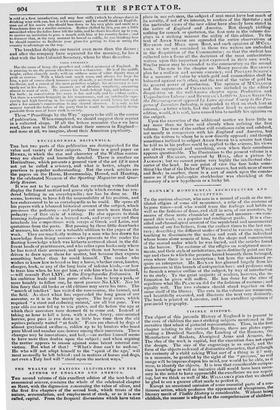ENCYCLOPAIDIA BRITANNICA.
THE last twc parts of this publication are distinguished for the value and variety of their subjects. There is a good paper on HOMER, ill which the rise and character of the Wolfian contro- versy are clearly and learnedly detailed. There is another on Horticulture, which presents a general view of the art (if it must not yet he called a science), and what is better, adapts its practices to popular understanding. But the crack articles are the papers on the Horse, Horsemanship, Hound, and Hunting, by the celebrated NIMROD of the Sporting Magazine and Quar- terly Review.
It was not to be expected that this roystering writer should display the formal method and grave style which custom has ren- dered befitting in an encyclopasdia ; nor has he done so. He seems, however, to have felt the responsibility of his position, and has endeavoured to be as encyclopmdic as he could. He opens all his papers with a laboured historical account of the subject, which possesses the pedantry — awl perhaps not much more than the pedantry—of that style of writing. Ile also appears to think learning indispensable in a learned work, and every now and then interlards his compositions with scraps of Greek and Latin, and quotations from the poets. But passing by these little drawbacks of manner, his articles are a valuable addition to the pages of the work. They are manifi:stly written by a man who has drawn his knowledge from lit ing sources—who presents to the reader the floating knowledge which was hitherto scattered about in the dif- ferent heads of practitioners, and who relies upon books only where he has tested their accuracy, and quotes them not because he is driven to draw upon them for matter, but because they express something better than he could himself. The reader who wishes to know how to breed or buy a horse, whether racer, hunter, charger, hack, or any of the long train of inferior kinds,—or how to train hint when he has got him, or ride him when he is trained. —will consult Part LXIV. of the Encyclopedia Britannica. If his ambition leads and his purse allows him to keep a pack, or more humbly to follow one, he must procure No.LXV. Nor let him fancy that old books or old editions may serve his turn. The "march of intellect" has visited the race-course, the kennel, and the field. As short whist has superseded the long game of our ancestor, so it is in the manly sports. The long races, which required " a stout and enduring animal," are all but gone. Two year olds are now fed up to win plates, and die before the age at which their ancestors were deemed fit to come out. Instead of' taking an hour to kill a hare, with a slow, heavy, sure-scented harrier, poor puss is run down in little less time than the old squires patiently waited "at fault." Foxes are chased by dogs of almost greyhound swiftness, ridden up to by hunters who boast pure blood and number race-horses among their ancestors. These changes may be innovations, and bad,—our author himself seems to have more than doubts upon the subject ; and when arguing the matter appears to reason against some latent internal con- viction. But what of that? "What's done can't be undone." He who will not adapt himself to the " spirit of the age," will most assuredly be left behind ; and in matters of horses and dogs, not even a Tory lord will "stand upon the ancient ways."


























 Previous page
Previous page